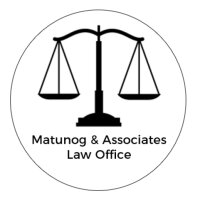Best Water Law Lawyers in Davao City
Share your needs with us, get contacted by law firms.
Free. Takes 2 min.
List of the best lawyers in Davao City, Philippines
About Water Law in Davao City, Philippines
Water Law in Davao City refers to the collection of national and local regulations governing the use, management, conservation, and protection of water resources. These laws cover a wide range of issues including water rights, distribution, pollution control, resource development, and penalties for violations. While national legislation such as the Philippine Water Code (Presidential Decree No. 1067) provides a general legal framework, Davao City implements additional ordinances and policies tailored to local needs, particularly given its rapid urbanization and abundant water resources.
Why You May Need a Lawyer
Engaging a lawyer experienced in Water Law is essential in several situations. Common scenarios include applying for water permits, resolving disputes over water rights or boundaries, addressing issues related to water pollution or contamination, complying with local water ordinances, contesting penalties for alleged violations, or negotiating contracts with water utility providers. Businesses seeking to develop land or extract water often require legal guidance to navigate the application process and environmental regulations. Individuals and communities may also need legal help to protect their access to clean water or appeal administrative decisions.
Local Laws Overview
Water Law in Davao City is shaped by both national and local regulations. The primary national law is the Philippine Water Code, which regulates water rights, usage, and allocation. The Environmental Code of Davao City (City Ordinance 0363-10) establishes local policies for sustainable water management, pollution control, and watershed protection. Davao City Water District (DCWD) governs public water supply and enforces service policies. Additionally, local ordinances restrict activities that may harm water sources, such as illegal logging, waste dumping, and unauthorized extraction. There are requirements for permits when utilizing water for commercial or industrial purposes, and strict penalties for violations of water quality standards.
Frequently Asked Questions
What is considered a water right in Davao City?
A water right is the legal entitlement to use a specific amount of water from a designated source for domestic, agricultural, commercial, or industrial purposes. It must be obtained through official permits issued by the National Water Resources Board or the appropriate local agency.
Do I need a permit to extract water from wells or rivers?
Yes, any person or business wishing to extract significant quantities of water from natural sources must obtain a water permit. This includes digging deep wells or diverting water from rivers and springs.
How are water disputes resolved in Davao City?
Water disputes are typically resolved through administrative proceedings before the National Water Resources Board or local offices such as the Davao City Water District. Legal action in courts may follow if settlements are not reached administratively.
Is it legal to build structures near rivers or creeks?
There are strict zoning and environmental regulations that govern construction near water bodies. Setback requirements and permits are needed, and building too close can lead to demolition and penalties.
What penalties exist for polluting water sources?
Penalties can include fines, imprisonment, closure of business operations, and suspension of permits. Both national and local laws impose sanctions on individuals and entities found polluting waterways or violating water quality standards.
How can I secure a water service connection for my property?
You must apply through the Davao City Water District, submitting all required documents and paying applicable fees. For large developments, approval from multiple agencies may be necessary.
What should I do if my water supply is contaminated?
Report the situation immediately to the Davao City Water District and the City Environment and Natural Resources Office. If contamination causes harm, seek legal counsel for possible health claims or damages.
Can water rights be transferred or inherited?
Water rights can be transferred or inherited, but the transfer requires administrative approval to ensure that usage remains lawful and sustainable.
What government body regulates water rights and permits?
At the national level, the National Water Resources Board is responsible. Locally, the Davao City Water District and the City Environment and Natural Resources Office play regulatory roles.
Are there special protections for community or indigenous water sources?
Yes, both national laws and local ordinances offer protection to water sources vital for indigenous or marginalized communities. Legal processes exist for the recognition and preservation of these resources.
Additional Resources
If you need further information or assistance, the following resources may be helpful:
- Davao City Water District (DCWD) - The main utility and regulatory authority for public water services in Davao City. - City Environment and Natural Resources Office (CENRO) - Handles environmental compliance, waterway protection, and pollution control. - National Water Resources Board (NWRB) - National oversight authority for water rights, permits, and policy. - Integrated Bar of the Philippines - Davao City Chapter - Provides lawyer referrals and legal aid services. - Non-governmental organizations such as Haribon Foundation and environmental advocacy groups operating locally can offer support for water-related concerns.
Next Steps
If you require legal assistance in matters related to Water Law in Davao City, begin by gathering all documents and details about your water issue. Make a written summary of your situation, noting any permits, correspondence, or official orders received. Reach out to a qualified lawyer with experience in Water Law or contact the Integrated Bar of the Philippines - Davao City Chapter for legal advice or referrals. For permit applications or technical concerns, visit the office of the Davao City Water District or the City Environment and Natural Resources Office. If your issue involves community or indigenous rights, consider consulting with organizations experienced in environmental and human rights law.
Taking proactive steps and seeking timely legal guidance can help you address your concerns and ensure compliance with Water Law regulations in Davao City.
Lawzana helps you find the best lawyers and law firms in Davao City through a curated and pre-screened list of qualified legal professionals. Our platform offers rankings and detailed profiles of attorneys and law firms, allowing you to compare based on practice areas, including Water Law, experience, and client feedback.
Each profile includes a description of the firm's areas of practice, client reviews, team members and partners, year of establishment, spoken languages, office locations, contact information, social media presence, and any published articles or resources. Most firms on our platform speak English and are experienced in both local and international legal matters.
Get a quote from top-rated law firms in Davao City, Philippines — quickly, securely, and without unnecessary hassle.
Disclaimer:
The information provided on this page is for general informational purposes only and does not constitute legal advice. While we strive to ensure the accuracy and relevance of the content, legal information may change over time, and interpretations of the law can vary. You should always consult with a qualified legal professional for advice specific to your situation.
We disclaim all liability for actions taken or not taken based on the content of this page. If you believe any information is incorrect or outdated, please contact us, and we will review and update it where appropriate.









